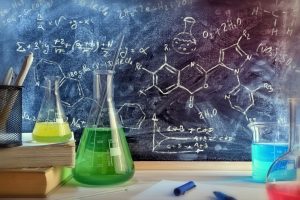The periodic table of chemical elements celebrates its 150th anniversary
By Naomi Ambrose, Staff Writer
On January 29, UNESCO declared 2019 the International Year of the Periodic Table of Chemical Elements. According to information retrieved from UNESCO’s website, the 15oth anniversary of the arrangement of the periodic table of chemical elements by Dmitri Mendeleev (a scientist who’s considered to be the one of the founding fathers of modern chemistry) will be celebrated throughout the year via various programs and sessions.
In case you need a refresher on what exactly the periodic table is: According to the Live Science website, “The periodic table of elements arranges all of the known chemical elements in an informative array. Elements are arranged from left to right and top to bottom in order of increasing atomic number. [The order] generally coincides with increasing atomic mass.”
Some of the events and activities to celebrate the table’s milestone include “an online competition” to assess secondary school students’ chemistry knowledge. The competition also aims to awaken the students’ interest in chemistry. An international symposium from February 11 to 12 in Murcia, Spain titled “Women and the Periodic Table of Elements” was also scheduled, in addition to another symposium at the 47th IUPAC World Chemistry Congress in Paris, France from July 5 to 12, “The Periodic Table at 150.”
Gregory Gibson, a chemistry instructor at Douglas College, shared his perspective about UNESCO’s initiative.
“I think any time there is an excuse to push science into the public discourse we should take advantage of it,” said Gibson in an email interview with the Other Press. “The 150 year anniversary of Mendeleev’s arrangement of the elements is a great excuse.”
Gibson also added, “There is so much information available nowadays, and not everyone can tell what is accurate and what is not. Holding events and celebrations helps push people towards accurate information about what science is, and what it does. [These types of events] also prompt people to think about topics that they may not [think about].
Events like UNESCO’s, he said, “may create a new interest or avenue of learning someone may not have pursued.”
When asked whether Douglas College’s chemistry department has any plans to celebrate the 150th anniversary of the periodic table, Gibson said that “[t]he Chemistry Department does not have any formal plans to hold an event at this point […] the year is still young.”
UNESCO’s 15oth anniversary celebration also raises the question as to whether this type of initiative is enough to maintain the interest of college students, young adults, and the wider society. As Gibson explained, “It’s hard to define what ‘enough’ is.”
Gibson also said, “Whatever enthusiasm for science and chemistry [that] can be spurred in young people, and the whole public really, is great to see. I think with science, like many things these days, there is a real disconnect between what people observe day-to-day and how well they understand the processes that are occurring. Anything [that can be done] to encourage people to bridge that gap for themselves is effort well spent.”



